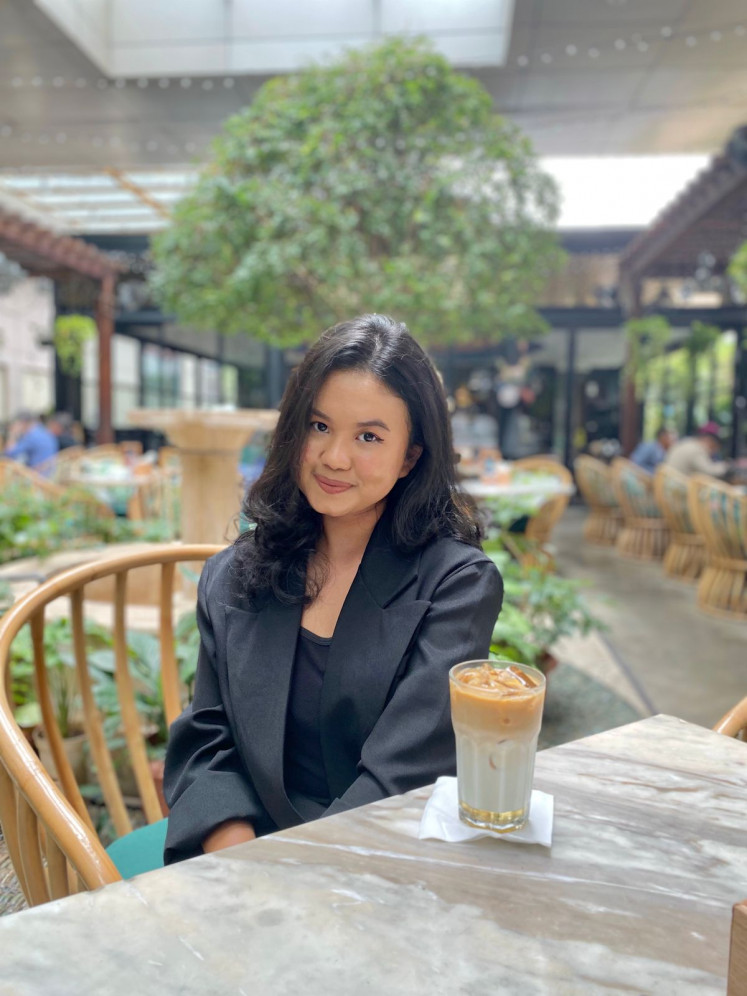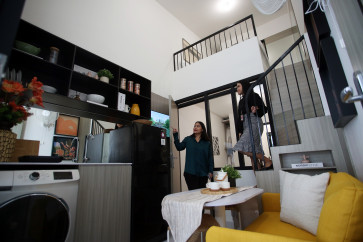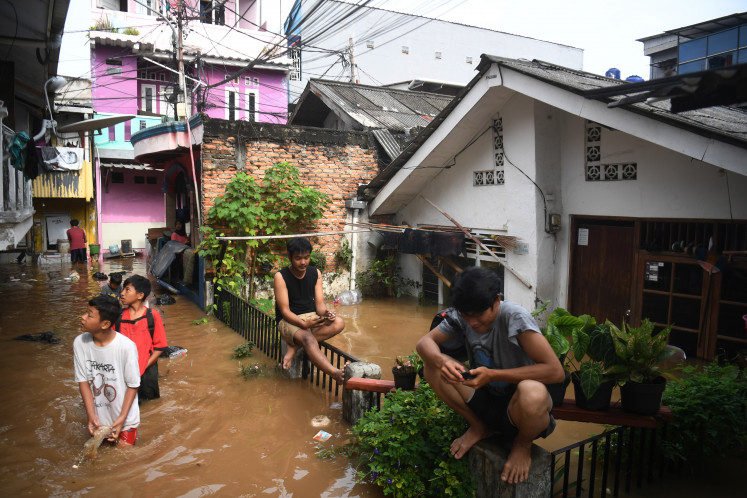Popular Reads
Top Results
Can't find what you're looking for?
View all search resultsPopular Reads
Top Results
Can't find what you're looking for?
View all search resultsEnglish, Jaksel style: Why some Indonesians jump between two languages
Change text size
Gift Premium Articles
to Anyone

Many South Jakartans occasionally alternate their language between Indonesian and English. We try to find out why.
Notable code-switching between Indonesian and English has become trending in everyday speech in Indonesia. The style is not unusual, especially for someone living in South Jakarta who speaks English at work and Indonesian at home, resulting in the so-called Bahasa Jaksel (South Jakarta language).
Michelle Rezky, a 22-year-old who works in a prominent position in a startup in South Jakarta with English as one of their main working languages, often finds herself code-switching.
“[I code-switch] quite often because [my] circle is also mostly South Jakartans,” Michelle said. “And many people mix English and Indonesian at work and on social media.”
“Because people are bilingual, perhaps South Jakartans are also frequently exposed to the outside world. So perhaps the brain switches or suddenly mixes them up without us even realizing it, which is also a common thing.”
Michelle believes the phenomenon to be nothing new. She sees this practice is widely spread in the country, not just in South Jakarta.
“It’s not something that only Indonesians [South Jakartans] do. I’ve read that it’s also common in other countries and it’s referred to as a ‘language switch’ from what I understand.”
Nadia Izzatunnisa, a master of humanities with a linguistic concentration who lives in Bekasi, recognizes that the emergence of the phenomenon—sometimes known as Indoglish—is not new, whether in Indonesia or elsewhere, but is accelerated by globalization.
“Code mixing is not new, whether in Indonesia or other countries. However, as the world becomes more globalized and information spreads more quickly, this phenomenon is becoming more widely known,” Nadia explained.
“Some Indonesians believe that those who can speak English have more prestige, which includes some English vocabulary used in Indonesian conversations,” Nadia added that some people also view English as a superstratum.
However, the 27-year-old speech annotator admits that the phenomenon is common, citing how intrinsically a language is “dynamic.”
“In linguistics, this phenomenon is known as code-mixing. This phenomenon is natural because language is dynamic. Speakers of a language have no restrictions on their ability to express themselves creatively,” said Nadia.
She provides several examples of how language evolves in terms of the dynamics of Indonesian as a language.
“As an example, many new words derived from informal conversations, such as baper [overly emotional], mager [couch potato] and kepo [stickybeak], made it into Kamus Besar Bahasa Indonesia [the Indonesian Dictionary].”
For Nadia, the emergence of Bahasa Jaksel also demonstrates that the use of English in Indonesia is increasing.
“The existence of the Bahasa Jaksel phenomenon can also show that the use of English in Indonesia, particularly in South Jakarta, is increasing,” said Nadia.

The cost of code-switching
Despite the frequent code-switching, Michelle admits the practice can be perceived as “less nationalist,” pointing out how it ended up “incorporating” English with Indonesian, the country’s national language.
“From a nationalist standpoint, it’s less nationalist because we ‘incorporate’ or are combining Indonesian and English,” she said. “But on the other hand, we bring up a new culture.”
Indonesians bear the most significant responsibility for speaking and preserving their national language, opines Michelle. As a result, she believes that speaking Indonesian, let alone “proper Indonesian” or “Bahasa Indonesia yang baik dan benar,” is mandatory.
“The Indonesian youth pledge Sumpah Pemuda demands us to speak Indonesian and to defend our nationalism through the usage of our national language. So we must use proper Indonesian—because who else will use proper Indonesian if not Indonesians?”
When asked how the phenomenon would ultimately affect Indonesian in general, Nadia believes Indonesia will not develop its rojak language—a more extreme example of the code-switching phenomenon in Malaysia that causes many Malay words to vanish in everyday speech.
“There are many Indonesians who care and speak Indonesian. And with the rise of language activists on social media, it appears that we can preserve the Indonesian language,” Nadia said.
Milliana “Emil” Dyah, a 22-year-old from Central Java who works in South Jakarta, is well aware of the phenomenon, though she admits she does not speak the language and is not “bothered” by it.
“[I am] not bothered because Bahasa Jaksel is a combination of Indonesian and English [both languages are understandable to her], so it’s fine,” said Emil.
Interestingly, from her experience, a topic discussed in Bahasa Jaksel is sometimes more understandable than in Indonesian alone, emphasizing how some English words can convey more accurate meaning.
“An explanation in Bahasa Jaksel can occasionally help you understand the topic discussed at hand, but it will most likely confuse you if you are unfamiliar with Bahasa Jaksel. [...] But for me, hearing Bahasa Jaksel can sometimes make it easier to understand [a certain topic].”
However, Emil believes that the use of Bahasa Jaksel can be tricky at times, to the point where if it is not used correctly, it can be perceived as misplaced.
“[But] also depending on what the speaker’s talking about, if the sentences they say are understandable, the person may appear intelligent. But if it isn’t, I’ll be skeptical of what they’re saying, as if they want to be perceived as cool.”

The takeaways
Regarding the use of Bahasa Jaksel, Michelle added that the most important thing to consider is the “portion.”
“Bahasa Jaksel is fine, in my opinion, but we should know the proper ‘portion’—when and for whom we use it,” said Michelle.
Michelle believes that people should try to adjust how they use their language, emphasizing how important it is to consider their situation.
“Whether we like it or not, we must be able to adjust our speaking. We can speak only in Indonesian or only in English. So it depends on what kind of situation we speak,” Michelle added.
Meanwhile, Nadia asserted that Indonesians must realize that language is constantly evolving.
“We must acknowledge that language evolves in lockstep with its speakers and thus the emergence of the code-mixing phenomenon is unavoidable,” said Nadia.
When discussing what wise steps Indonesians should take to deal with the phenomenon, Nadia believes it is better to prioritize understanding Indonesian first out of other choices.
“It is wiser to stick to our language. In another sense, the priority of understanding a language should remain focused on Indonesian,” Nadia said.
She also anticipated that the government would continue to regulate the use of the language so that it would stand the test of time.
“[As for the government], the rules governing the Indonesian language should be designed to make it easier for Indonesians to understand its use,” Nadia concluded.
ohmg









